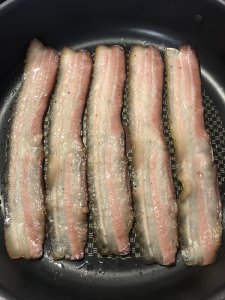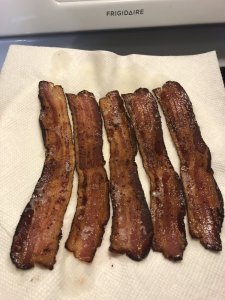Bacon and Moisture
- Thread starter Tex1911
- Start date
-
Some of the links on this forum allow SMF, at no cost to you, to earn a small commission when you click through and make a purchase. Let me know if you have any questions about this.
You are using an out of date browser. It may not display this or other websites correctly.
You should upgrade or use an alternative browser.
You should upgrade or use an alternative browser.
SmokingMeatForums.com is reader supported and as an Amazon Associate, we may earn commissions from qualifying purchases.
- May 12, 2011
- 22,167
- 7,168
Brine Cured Bacon will render some water, nothing like store bought but some. Dry Rub Cured Bacon will render next to no moisture. Shrinkage is directly related to cooking temp. A hot 400° Cast Iron Pan will shrink the bacon more than strips laid out on a baking sheet and slow baked at 325...JJ
- Dec 30, 2018
- 99
- 26
Man, I love this site. So much good info. I did not know cooking temp had any effect at all on the shrinkage. I am going to try cooking in oven as mentioned above too. I recently discovered by accident that putting bacon the MES worked out really well too. I placed a few slices above the meat I was cooking so the bacon grease would drip down on it. Turned out the bacon cooked really well just laying them directly on the cooking grates. I actually took the strips out once they were done and replaced with new strips. They were chewy and not crispy which was a nice change.
Speaking of cooking, have any of you tried the microwave method? I never have but recall seeing a rack to lay the bacon in and cooking in Microwave. Bacon is so cool; fried, baked in oven, on the pit and even microwave.
Speaking of cooking, have any of you tried the microwave method? I never have but recall seeing a rack to lay the bacon in and cooking in Microwave. Bacon is so cool; fried, baked in oven, on the pit and even microwave.
You will get a lot more shrinkage cooking bacon in a microwave, regardless of whether they were wet or dry brined.
As for moisture content, store-bought, packaged bacon is injected with water to bring up the weight. So you're probably paying bacon prices for an ounce or more of water in the package. Less water in the bacon also means less splattering in the pan.
As for moisture content, store-bought, packaged bacon is injected with water to bring up the weight. So you're probably paying bacon prices for an ounce or more of water in the package. Less water in the bacon also means less splattering in the pan.
- Sep 15, 2012
- 19,418
- 17,220
Back in the days when microwave oven usage would dim every light in the house. My mother tried using it for bacon. Sometimes she would use a plate with paper towels under and over the bacon. Other times she would use one of those Ron Popeil type devices that are supposed to revolutionize the world. The bacon if I recall was just OK. It was usually used to top off some of my dad's overdone cheeseburgers or as a quick BLT after a hockey game. It didn't come close to the Sunday morning cast-iron fried bacon. This was back in the early 70s so I can't say if there's a better way to nuke it now. But I think I remember it being very very crisp.
Chris
Chris
Yes.Will it be crispy if cooked in the microwave?
Lot of great answers for you that is the great thing about this forum you get many ideas on how to do something.
Warren
Warren
Will it be crispy if cooked in the microwave?
I have read where microwaves do not heat evenly... Fat and water content are not evenly distributed throughout the meat and therefore the meat may have not reached the proper temperature to kill all bacteria and pathogens in some areas...
Just something to think about....
- May 12, 2011
- 22,167
- 7,168
- Dec 30, 2018
- 99
- 26
Good points on the fat and meat part in the microwave. I think I'll stick to good ol fashion fried bacon. A good non-stick pan and one of those weighted glass lids that hold it down works really well. If it aint broke, dont fix it right?
I do have an older skillet that isnt non-stick and like pugsbrew mentioned, I have to add bacon grease to it or it will stick as well. Speaking of bacon, I just dry-cured 3 bellies and placed them in fridge for a couple of weeks rest. I'm going to try and compare the moisture from my homemade vs store bought and see if there is a major difference.
I do have an older skillet that isnt non-stick and like pugsbrew mentioned, I have to add bacon grease to it or it will stick as well. Speaking of bacon, I just dry-cured 3 bellies and placed them in fridge for a couple of weeks rest. I'm going to try and compare the moisture from my homemade vs store bought and see if there is a major difference.
- Dec 30, 2018
- 99
- 26
Dave, is that on a non-stick? Mine has been hit and miss with adding lard but I think it is more attributed to the type of pan I use. Honestly, I havent paid enough attention to the pans. I grab whatever is in reach, sometimes its an aged pan and other times not.
SmokingMeatForums.com is reader supported and as an Amazon Associate, we may earn commissions from qualifying purchases.
Similar threads
- Replies
- 13
- Views
- 817
- Replies
- 4
- Views
- 6K
- Replies
- 3
- Views
- 3K
Hot Threads
-
Well. Look what Santa dropped off early!
- Started by Steve H
- Replies: 28
- Blowing Smoke Around the Smoker.
-
The Best Egg Salad - Enabler Version
- Started by Chris_in_SoCal
- Replies: 24
- ABT's and all things Appetizers
-
Chicago Cracker-Thin 'Za
- Started by Quiganomics
- Replies: 16
- Pizza
-
Our Thanksgiving Spread
- Started by Colin1230
- Replies: 11
- Blowing Smoke Around the Smoker.







